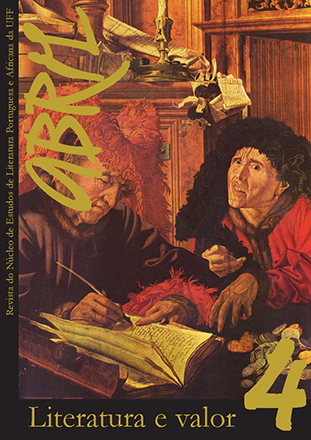Quem quer ser Raskólnikov? - O theatrum mundi em antes do degelo
DOI:
https://doi.org/10.22409/abriluff.v3i4.29784Palavras-chave:
Barroco, Representação, Agustina Bessa-Luís, Fiódor Dostoiévski, Romance português contemporâneoResumo
Este ensaio aborda o romance Antes do degelo, de Agustina Bessa-Luís, a partir de um traço da cultura do Barroco que parece permanecer na prosa portuguesa contemporânea. A percepção do mundo como teatro possibilita problematizar as relações do homem com a realidade e, nesse contexto, com a linguagem. Desse modo, o explícito diálogo intertextual entre o romance português e o clássico russo Crime e castigo, de Fiódor Dostoiévski, serve de ponto de partida para nossa leitura, que busca enfatizar, além da tensão própria ao processo de retomada do referente literário, outros dois aspectos correlacionados: primeiro, a tensa relação entre o crime e a linguagem que supostamente o representa; segundo, o processo de “deturpação” por que passa a trajetória de Raskólnikov, nas mãos de Agustina, processo este que garante a atualização e a pertinência de suas reflexões em torno dos valores que organizam este tempo depois do degelo.
Downloads
Downloads
Publicado
Edição
Seção
Licença
Autorizo a Revista Aabril - NEPA/UFF a publicar o artigo que ora submeto, de minha autoria/responsabilidade, caso seja aceito para publicação online. Declaro, ainda, que esta contribuição é original, que não está sendo submetida a outro editor para publicação, e assino a presente declaração como expressão da verdade.
Os trabalhos publicados no espaço virtual da Revista Abril serão automaticamente cedidos, ficando os seus direitos autorais reservados à Revista Abril. Sua reprodução, total ou parcial, é condicionada à citação dos autores e dos dados da publicação.

A Revista Abril utiliza uma Licença Creative Commons - Atribuição-NãoComercial 4.0 Internacional (CC BY-NC 4.0).









